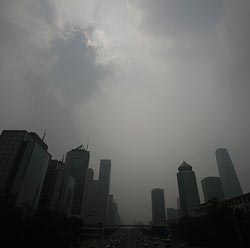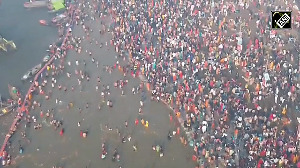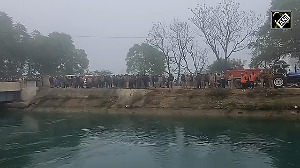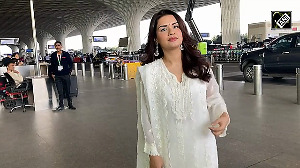Beijing has vowed the Olympic Games will take place under blue skies, not the murky "sauna" haze that has shrouded the city recently, but even on apparently clear days pollution levels may not be safe for athletes.
Officials lavished 120 billion yuan ($17.6 billion) on cleaning up the capital with factories dozens of miles away closed down, construction halted, and over half the city's 3.3 million cars cleared from the roads.
Still, even when Beijing says the air is clear, athletes and their coaches may have cause for concern.
Most Chinese air pollution standards are outside World Health Organisation guidelines. Moreover, experts say that the pollution index China uses to tell ordinary citizens whether the air is safe -- a "blue sky" day -- is seriously flawed.
 It only uses average measurements across the capital, so some spots could have dangerous levels even when overall readings say it is safe to venture out. And some hazardous pollutants are not included in the index, experts say.
It only uses average measurements across the capital, so some spots could have dangerous levels even when overall readings say it is safe to venture out. And some hazardous pollutants are not included in the index, experts say.
The grey haze hanging over Beijing on Monday highlighted the city's ongoing problems. City pollution monitors said air quality on Monday was Grade II, making it officially a "blue sky day" -- though to the naked eye there was little to distinguish it from the four previous days when air did not meet national standards.
Many athletes have delayed arriving in Beijing until the last minute to avoid bad air, and the International Olympic Committee said it may reschedule endurance events such as the marathon to prevent health risks to athletes if pollution is bad.
Marathon world record holder Haile Gebrselassie has already pulled out of the marathon over fears of damaging his health.
And the Australian Olympic Committee has also said its athletes would be allowed to withdraw if pollution poses a threat.
"For us the athlete's attitude to the event is paramount," AOC vice president Peter Montgomery told reporters.
In contrast Athens, host of the last Games, had long ago dispersed the heavy cloud of smog that polluted most of Greece's Attica region in the 1970s and 1980s.
WHAT IS SAFE?
China's national limits on major pollutants, with effects including breathing problems and lung damage, are more lenient than most of those of the WHO and the European Union.
Some environmentalists say that alone means the country's best may not be good enough for athletes -- because even if the air meets national standards, it will still fail the WHO test.
"If the level is above the line, it is unhealthy," said Paolo Revellino, author of a UN Environment Programme report on the Olympics released last year.
But others argue individual guidelines are not Beijing's main problem, as they are also more stringent than many US rules, and point out that China has tried to set itself realistic goals.
"The intention is that they should reflect the current capacities of the air management system. You can see some countries that take the [WHO] guidelines but don't do any monitoring," said Frank Murray, an air quality expert at Murdoch University's School of Environmental Science.
CONFUSING BLUE SKIES
More of a problem is the Air Pollution Index used to decide if Beijing is enjoying a "blue sky day" and give ordinary citizens a quick summary of air quality. It is riddled with problems that magnify the effect of relatively lax standards.
"I prefer not to deal with it because it is not internationally recognised," said the UN's Revellino.
The index uses average values across the city and over a 24-hour period, meaning pockets and temporary peaks of dangerous pollution can be ignored.
It does not attempt to calculate the cumulative effect of different pollutants -- so as long as each one is just inside national guidelines the air is considered safe.
And it omits several dangerous pollutants, including the finest type of dust-like particulate matter.
"It's the smaller particles that are more hazardous, because they are easily absorbed into the lungs, into the blood stream. And in China they don't have any official measurement of [them]," said a Western diplomat with an environment brief.
And because colourless ozone, a particular summer problem because sunlight helps produce it, is not included, athletes can't even trust their eyes.
"The sky can appear blue, but air can be still polluted ... Ozone can cause some respiratory problems and affect lung functions, so it can produce adverse effects to children, elderly and most likely athletes competing outdoors," the diplomat added.








 © 2025
© 2025